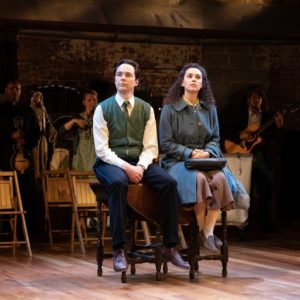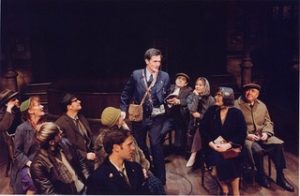BY CHRISTOPHER BYRNE
Ragtime on Broadway was one of the largest productions of its time with a cast of 52 and 28 musicians in the pit. It opened the Ford Center for the Performing Arts, now the Lyric, one of the largest houses on Broadway. Lynn Ahrens and Stephen Flaherty wrote the score, and Terrence McNally wrote the book, for which he won the Tony.
How do you follow up something like that? In the case of this particular creative team, the answer was to go small, create an intimate, chamber piece. Ahrens, Flaherty, and McNally had been looking for an idea when McNally suggested they look at the 1994 film, A Man of No Importance, which starred Albert Finney as a Dublin bus conductor who runs an amateur theater company and is a deeply closeted gay man who is secretly (or not so secretly as it is revealed) in love with his driver Robbie Fay. The story is set in the early 1960s, when being gay was still a crime in Ireland.
For McNally, a passionate gay rights advocate and a playwright who never shied away from gay issues, it was about as perfect as it gets for source material. It was a tale about Archie Byrne, a man struggling to be authentic who finds relief in the theater, sublimating himself in the St. Imelda’s players—a group of local amateurs who, whatever their talents, feel the magic and draw of the playhouse. When Archie decides to stage Oscar Wilde’s Salome, the Catholic church where they’ve used the hall shuts down the “obscene” work, no matter how much Archie says it’s art. Archie is exposed as gay, and while for a time it looks like his life is over, the healing power of theater wins the day. McNally’s book also takes pains to express (gorgeously, by the way) that Archie is not the only flawed character. Adele Rice, who shows up on the bus one day, is a beautiful young woman who herself has a secret, and Archie convinces her to play Salome, enrolling her in the power of theater to heal the heart.
In adapting the movie, McNally added a ghostly character of Oscar Wilde, which allowed Archie to more fully express himself through conversations with his artistic hero. In Archie’s mind, Wilde had the freedom to express himself authentically and his love for Bosie in the way Archie could not express for Robbie. Ahrens’ lyrics have the directness of reality and the poetry of art that characterize all her work, and Flaherty’s score is deceptively simple, full of Celtic harmonics and gorgeous subtleties that he’s known for.

The show opened in 2002 at Lincoln Center in 2002 with a cast of 13 led by Roger Rees and a band of 7, but a lukewarm review in the New York Times scotched a rumored Broadway transfer. The show had some regional productions and it lived on only as a cast recording. (In looking back at this piece, some involved with the production lamented the lack of a transfer while others said it was never considered. Show biz is full of legends and stories that way.)
Two decades later, the piece is getting a magnificent revival at Classic Stage in Manhattan (CSC). Produced in an intimate setting, and with a cast led by Jim Parsons and Mare Winningham, it has an immediacy and lyricisim that is nothing short of stunning. The revival was the idea of director John Doyle, who was looking for something to do as his last production as artistic director at CSC. McNally had died in 2020, and Doyle approached producer Tom Kirdahy, Terrence’s widower, about reviving the piece.
Doyle had discovered the material and growing up as a closeted gay man in Scotland in the 1960s, it spoke to him in deeply personal ways. “I’m a gay man , a gay man who was exploring my sexuality while it was still an imprisonable act. I know what it felt like, and I can remember when living in a small community where you daren’t express who you were—long before the days when ‘coming out’ became part of our vocabulary.”
Doyle then approached Ahrens and Flaherty who were eager to revisit the piece. According to Flaherty, Doyle wanted to make the music more Celtic, authentic to the locale. Aherns said they began, with the support of Kirdahy, to simplify the piece, to take away anything that wasn’t necessary. As an artistic journey, McNally was an expansive writer and Doyle is a minimalist director, and the result is strikingly powerful. It is now staged in one act, with actors also playing some of the instruments—a Doyle trademark. Listening to Bruce Coughlin’s new orchestrations, one could feel they are being entertained in the local pub, which is exactly the effect the creative team was going for.
Doyle has staged the piece in 1964, a time when censorship limited expression; it would be four more years till that stopped, along with imprisonment for being gay. Archie’s fear hangs over the piece, and Doyle hasn’t sentimentalized or softened the threats, which gives the piece authenticity—and, sadly, relevance to the present. The happy ending may seem a bit forced with Archie being accepted for who he is, but as Wilde wrote: “The good ended happily, and the bad unhappily. That is what fiction means.” Still, McNally is nonetheless as honest as always. Archie may never find the love he craves, but he’s been restored to his friends and his life, even with his terrible secret revealed.
Jim Parsons is deeply moving as Archie, fully capturing a conflicted soul looking for release. AJ Shively Robbie Fay is a blaze of energy and charm, particularly in “The Streets of Dublin,” a song that takes the audience into the character’s world. Winningham is extraordinary as Lily, Archie’s sister, who doesn’t understand her brother, till she does and loves him anyway. Shereen Ahmed is heartfelt and powerful as Adele, the perfect complement to Archie as they both struggle with their secrets. The rest of the company is outstanding as well.
Fifteen years before the Obergefell decision, and “love wins” became part of our vocabulary, Archie Byrne sang, “You just have to love who you love.” “A Man of No Importance” reminds us that this our fate as humans—and it’s one we must never stop fighting for.

A Man of No Importance
CSC
136 East 13th Street
Tues-Sun 7 p.m.; Sat 1 p.m.; Sun 2 p.m. through December 18
$92-$132
Ovationtix.com or 212-677-4210 x 10
1 hour 45 mins, no intermission








More Stories
Broadway Preview: Lewis Flinn’s Cabaret
Broadway Review: Smash
Off-Broadway Review: Vanya